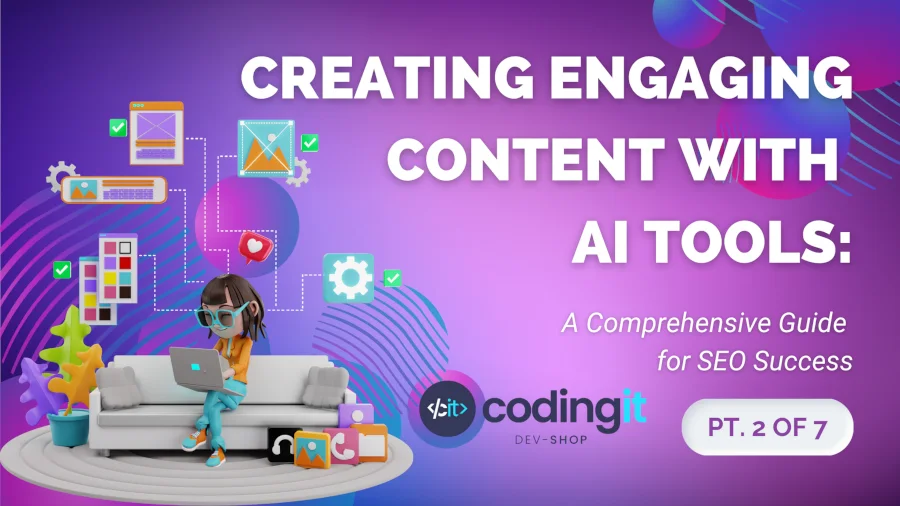Content creation has emerged as a pivotal element in the success of marketing and branding efforts. However, with the ever-increasing competition for online visibility, businesses must find ways to stand out amidst the noise and connect with their audience on a deeper level. This is where the power of artificial intelligence (AI) comes into play.
AI has revolutionized numerous industries, and content creation is no exception. By leveraging AI tools, businesses can unlock a world of possibilities, enabling them to create compelling, relevant, and SEO-friendly content that resonates with their audience. This article is designed to equip you with the knowledge and skills to harness the immense potential of AI in content creation.
By following the comprehensive guidance provided in this series of articles, this is only part 2 of the 7 part series, you will gain a deeper understanding of AI-powered content creation and its immense potential for driving organic traffic and user engagement. Equipped with practical knowledge and valuable insights, you will be empowered to leverage AI tools to create compelling and optimized content that sets you apart in the hyper-competitive digital landscape.
Now, let’s begin exploring the world of AI-powered content creation and unlocking the opportunities it holds!
- Choosing the Right AI Tools for Content Creation
- Overview of AI Tools for Content Creation
- Evaluating AI Tools for Quality and Reliability
- Determining the Best AI Tool for Your Content Needs
- Data Privacy and Security
- Integration with Existing Workflows
- Ongoing Training and Support
- Cost and Return on Investment (ROI)
- Future-proofing and Scalability
- Some Success Stories
- Conclusion
Choosing the Right AI Tools for Content Creation
Overview of AI Tools for Content Creation
The world of AI tools for content creation is vast and constantly evolving. Before diving into the selection process, it is essential to have an overview of the various tools available. These tools encompass a wide range of functionalities, including content generation, optimization, personalization, and analytics.
Content generation tools leverage AI algorithms, Natural Language Processing, Generative Pre-Transformers, and more tech to assist in creating written, video, and audio content. They can help generate article outlines, suggest topic ideas, convert text to voice, create and edit video, or even produce full-length articles based on given inputs. Examples of popular content generation tools include:
Content optimization tools focus on improving the quality and effectiveness of your content. They can assist in enhancing readability, suggesting improvements in sentence structure, or providing guidance on keyword optimization. Tools such as Grammarly and Yoast SEO are widely used for content optimization purposes.
Personalization tools utilize AI algorithms to tailor content based on individual user preferences, behavior, or past interactions. They can provide personalized product recommendations, create dynamic content variations, or even power interactive chatbots. Amazon’s recommendation engine and Netflix’s content personalization algorithms are well-known examples of personalization tools.
Analytics tools powered by AI algorithms help measure and analyze the performance of your content. They provide insights into key metrics such as engagement rates, conversion rates, and user behavior patterns. Tools like Google Analytics, BuzzSumo, and SEMrush offer comprehensive analytics functionalities.
So, depending on your needs, there is most likely an AI tool to help!

Evaluating AI Tools for Quality and Reliability
When selecting AI tools for content creation, it is crucial to assess their quality and reliability. Several factors should be considered during the evaluation process to ensure the chosen tools deliver accurate and valuable results.
First and foremost, consider the reputation and credibility of the AI tool providers. Research their track record, user reviews, and customer satisfaction ratings. Look for testimonials or case studies that highlight successful implementations of the tools in real-world scenarios.
Next, evaluate the accuracy and reliability of the AI algorithms underlying the tools. Are they based on robust models trained on diverse and reliable datasets? Assess the level of transparency provided by the tool providers regarding the training data and model architecture.
Consider the tool’s user interface and ease of use. A user-friendly interface can significantly impact your productivity and efficiency in utilizing the tool. Look for tools that offer intuitive dashboards, clear instructions, and responsive customer support.
Finally, assess the scalability and integration capabilities of the AI tools. Will the tool be able to handle your content creation needs as your business grows? Ensure compatibility with your existing systems, workflows, and content management platforms to ensure seamless integration.
Determining the Best AI Tool for Your Content Needs
Choosing the best AI tool for your content creation needs requires a careful consideration of your specific requirements and goals. Start by identifying the key challenges and pain points you aim to address with AI-powered tools. This could be improving content productivity, enhancing content quality, or personalizing user experiences.
Consider the features and functionalities offered by the AI tools and match them with your content strategy objectives. For example, if your goal is to optimize content for SEO, look for tools that provide keyword suggestions, readability analysis, and SEO recommendations. If you aim to enhance personalization, seek tools with robust recommendation engines or natural language generation capabilities.
Additionally, take into account your available resources, budget constraints, and technical expertise. Some AI tools may require a higher level of technical knowledge or investment, while others offer more user-friendly interfaces and affordable pricing plans.
To determine the best AI tool for your content needs, it is valuable to leverage trial periods or demos offered by the tool providers. This allows you to test the tools firsthand and assess their suitability for your specific use cases. Solicit feedback from your content creation team or consult with industry experts.

Data Privacy and Security
When integrating AI tools into your content creation process, ensuring data privacy and security is of utmost importance. It is crucial to evaluate the tools’ compliance with data protection regulations and their approach to handling and storing data.
To safeguard your data, begin by thoroughly assessing the data privacy policies of AI tool providers. Look for transparency regarding the collection, storage, and usage of your data. Ensure that the tools adhere to relevant regulations, such as the General Data Protection Regulation (GDPR) or any industry-specific guidelines.
Additionally, consider the security measures implemented by the AI tool providers. Look for encryption protocols, secure data transmission, and robust access controls to protect your sensitive information. It is essential to understand how the tools handle data breaches or security incidents and their incident response procedures.
By choosing AI tools with strong data privacy and security practices, you can maintain the confidentiality and integrity of your content-related data and mitigate potential risks.
Integration with Existing Workflows
Seamless integration of AI tools with your existing workflows and content management systems is paramount to optimize efficiency and streamline your content creation processes.
Selecting AI tools that can seamlessly integrate with your current workflows offers several benefits. It enables a smooth transition and minimizes disruptions to your established processes. Integration ensures that the AI tools work in harmony with your existing technologies, maximizing their potential impact.
Consider the compatibility of the AI tools with your content management system (CMS) and other relevant software platforms. Look for tools that offer robust APIs or plugins, facilitating easy integration. Evaluate whether the tools can handle your specific content formats, such as text, images, or videos.
Efficient integration fosters collaboration among team members, enabling them to leverage AI tools within their familiar work environment. This integration can lead to enhanced productivity, streamlined content creation workflows, and improved overall efficiency.

Ongoing Training and Support
The availability of comprehensive training and support from AI tool providers plays a vital role in ensuring a smooth onboarding experience and ongoing assistance for your content creation team.
When considering AI tools for content creation, evaluate the training resources provided by the tool providers. Look for documentation, tutorials, and knowledge bases that offer detailed guidance on tool usage, best practices, and troubleshooting tips. Clear instructions and well-defined workflows can expedite the learning process for your team.
Equally important is the accessibility of customer support channels. Assess the responsiveness and effectiveness of the tool providers’ support systems. Look for options such as email, chat, or phone support to address any queries or technical issues that may arise during tool usage.
Adequate training and reliable support enable your team to harness the full potential of the AI tools. It empowers them to overcome challenges, utilize advanced features, and optimize their content creation efforts.
Cost and Return on Investment (ROI)
Understanding the cost considerations associated with AI tools for content creation is crucial for making informed decisions. Evaluate the pricing models offered by tool providers, such as subscription-based or usage-based pricing, and compare them based on your budget and anticipated usage.
While cost is a significant factor, it is equally important to assess the potential return on investment (ROI) that AI tools can provide. Consider the anticipated benefits, such as improved productivity, enhanced content quality, and increased user engagement. Evaluate how the tools align with your content strategy objectives and the potential impact on your business outcomes.
To determine ROI, explore case studies or conduct pilot projects to measure the tool’s effectiveness. Quantify improvements in content creation speed, quality, or user metrics to assess the tangible benefits. Cost also needs to be associated with the time needed to learn to use these tools effectively. How many hours will it take you and your team to become proficient? How much time can you invest to make the most of our the tool’s capabilities? How much can the tool help improve your current processes? These are just some of the many questions you should be asking to help your determine whether the ROI is achievable within your timeline. Balancing the total costs with the expected ROI and your timeline will help you make a financially sound decision.

Future-proofing and Scalability
Selecting AI tools that are future-proof and scalable is essential to ensure their long-term relevance and accommodate your evolving content creation needs.
Assess the tool providers’ commitment to innovation and research in AI technologies. Consider whether they regularly update their tools to incorporate the latest advancements. Look for evidence of their adaptability to emerging content creation trends and changing industry requirements.
Scalability is another crucial aspect to consider. Evaluate whether the AI tools can handle increasing content volumes as your business expands. Assess their ability to accommodate additional users, content formats, and languages. Consider whether the tools can integrate with other AI solutions or support customization to meet your evolving needs.
By choosing future-proof and scalable AI tools, you can stay ahead of the curve, leverage emerging technologies, and ensure a sustainable and adaptable content creation ecosystem.
Some Success Stories
Real-world case studies and success stories provide invaluable insights into the effectiveness of AI tools for content creation. Here are just a few examples you may not even realize are true:
1. Netflix
The popular streaming platform is renowned for its effective content personalization algorithms. By leveraging AI tools, Netflix analyzes user viewing patterns, preferences, and feedback to curate personalized recommendations for each user. This approach has significantly improved user engagement, retention, and overall satisfaction, leading to Netflix’s success as a leading provider of on-demand entertainment.
2. The Washington Post
A prominent news organization, implemented AI tools for content optimization and audience engagement. Through the use of AI algorithms, they were able to analyze user data, optimize headlines, and customize article recommendations based on readers’ interests. This strategy resulted in increased user engagement, longer session durations, and a higher number of article shares across social media platforms.
3. Grammarly
Of course, an AI-based writing assistant tool has gained widespread popularity for its ability to enhance content quality and grammar. Through its robust algorithms, Grammarly provides real-time suggestions for spelling, grammar, and clarity improvements. With millions of users worldwide, Grammarly has become a valuable tool for individuals, businesses, and professionals, helping them produce error-free and polished written content.
By studying these success stories, you can gain valuable insights into the benefits, challenges, and best practices associated with integrating AI tools into your content creation processes. Demand success stories for the tools you are considering to implement as if they don’t have them, you will need to be the example. Are you ready for that?
Conclusion
Selecting the right AI tools for content creation is a critical decision that can significantly impact the effectiveness and efficiency of your content strategy. Throughout this article, we have explored the vast landscape of AI tools available, ranging from content generation and optimization to personalization and analytics.
To make informed decisions, it is essential to evaluate the quality, reliability, and reputation of the AI tool providers. Consider factors such as the accuracy of the underlying algorithms, user-friendly interfaces, scalability, and integration capabilities with existing workflows. Furthermore, understanding data privacy and security measures is crucial to ensure compliance with regulations and protect sensitive information.
By aligning the features and functionalities offered by AI tools with your specific content needs and objectives, you can enhance content productivity, improve quality, and deliver personalized experiences to your audience. It is also essential to consider the cost implications and potential return on investment associated with adopting AI tools.
Ready for more? Part 3 of this series is entitled “Preparing AI Models for Optimal Performance.” The goal of this article will be to make sure you are getting the most out of the tools you have chosen.
Should you want a professional team of AI experts to help your business implement AI tools more thoroughly, then look no further than the amazing team at CodingIT. We have decades of experience in building Machine Learning Applications, Auditing AI use within companies, and building or training Neural Networks. Reach out to us and tell us how we can best serve you!
